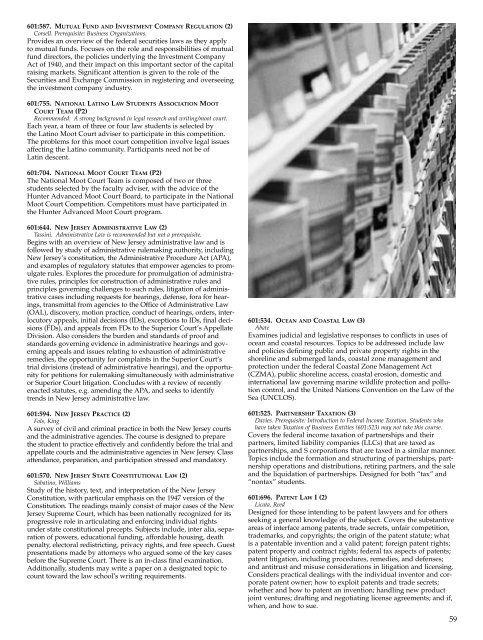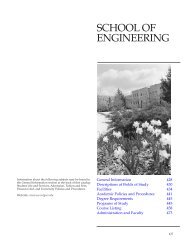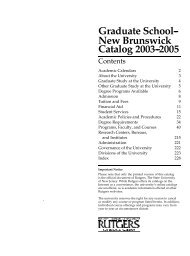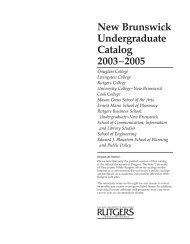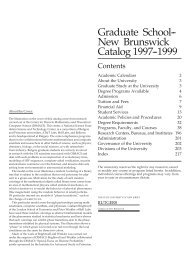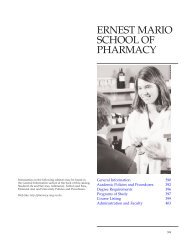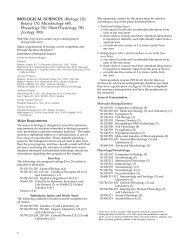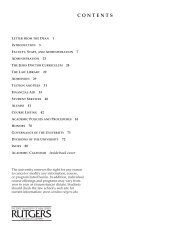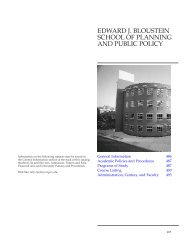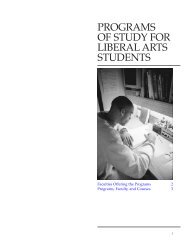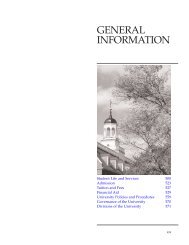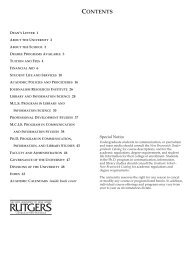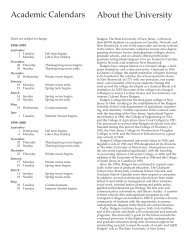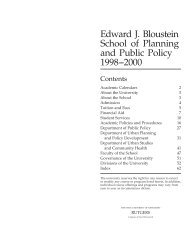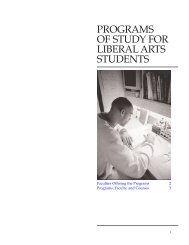Rutgers University School of Law-Camden - Catalogs - Rutgers, The ...
Rutgers University School of Law-Camden - Catalogs - Rutgers, The ...
Rutgers University School of Law-Camden - Catalogs - Rutgers, The ...
Create successful ePaper yourself
Turn your PDF publications into a flip-book with our unique Google optimized e-Paper software.
601:587. MUTUAL FUND AND INVESTMENT COMPANY REGULATION (2)<br />
Corsell. Prerequisite: Business Organizations.<br />
Provides an overview <strong>of</strong> the federal securities laws as they apply<br />
to mutual funds. Focuses on the role and responsibilities <strong>of</strong> mutual<br />
fund directors, the policies underlying the Investment Company<br />
Act <strong>of</strong> 1940, and their impact on this important sector <strong>of</strong> the capital<br />
raising markets. Significant attention is given to the role <strong>of</strong> the<br />
Securities and Exchange Commission in registering and overseeing<br />
the investment company industry.<br />
601:755. NATIONAL LATINO LAW STUDENTS ASSOCIATION MOOT<br />
COURT TEAM (P2)<br />
Recommended: A strong background in legal research and writing/moot court.<br />
Each year, a team <strong>of</strong> three or four law students is selected by<br />
the Latino Moot Court adviser to participate in this competition.<br />
<strong>The</strong> problems for this moot court competition involve legal issues<br />
affecting the Latino community. Participants need not be <strong>of</strong><br />
Latin descent.<br />
601:704. NATIONAL MOOT COURT TEAM (P2)<br />
<strong>The</strong> National Moot Court Team is composed <strong>of</strong> two or three<br />
students selected by the faculty adviser, with the advice <strong>of</strong> the<br />
Hunter Advanced Moot Court Board, to participate in the National<br />
Moot Court Competition. Competitors must have participated in<br />
the Hunter Advanced Moot Court program.<br />
601:644. NEW JERSEY ADMINISTRATIVE LAW (2)<br />
Tassini. Administrative <strong>Law</strong> is recommended but not a prerequisite.<br />
Begins with an overview <strong>of</strong> New Jersey administrative law and is<br />
followed by study <strong>of</strong> administrative rulemaking authority, including<br />
New Jersey’s constitution, the Administrative Procedure Act (APA),<br />
and examples <strong>of</strong> regulatory statutes that empower agencies to promulgate<br />
rules. Explores the procedure for promulgation <strong>of</strong> administrative<br />
rules, principles for construction <strong>of</strong> administrative rules and<br />
principles governing challenges to such rules, litigation <strong>of</strong> administrative<br />
cases including requests for hearings, defense, fora for hearings,<br />
transmittal from agencies to the Office <strong>of</strong> Administrative <strong>Law</strong><br />
(OAL), discovery, motion practice, conduct <strong>of</strong> hearings, orders, interlocutory<br />
appeals, initial decisions (IDs), exceptions to IDs, final decisions<br />
(FDs), and appeals from FDs to the Superior Court’s Appellate<br />
Division. Also considers the burden and standards <strong>of</strong> pro<strong>of</strong> and<br />
standards governing evidence in administrative hearings and governing<br />
appeals and issues relating to exhaustion <strong>of</strong> administrative<br />
remedies, the opportunity for complaints in the Superior Court’s<br />
trial divisions (instead <strong>of</strong> administrative hearings), and the opportunity<br />
for petitions for rulemaking simultaneously with administrative<br />
or Superior Court litigation. Concludes with a review <strong>of</strong> recently<br />
enacted statutes, e.g. amending the APA, and seeks to identify<br />
trends in New Jersey administrative law.<br />
601:594. NEW JERSEY PRACTICE (2)<br />
Fols, King<br />
A survey <strong>of</strong> civil and criminal practice in both the New Jersey courts<br />
and the administrative agencies. <strong>The</strong> course is designed to prepare<br />
the student to practice effectively and confidently before the trial and<br />
appellate courts and the administrative agencies in New Jersey. Class<br />
attendance, preparation, and participation stressed and mandatory.<br />
601:570. NEW JERSEY STATE CONSTITUTIONAL LAW (2)<br />
Sabatino, Williams<br />
Study <strong>of</strong> the history, text, and interpretation <strong>of</strong> the New Jersey<br />
Constitution, with particular emphasis on the 1947 version <strong>of</strong> the<br />
Constitution. <strong>The</strong> readings mainly consist <strong>of</strong> major cases <strong>of</strong> the New<br />
Jersey Supreme Court, which has been nationally recognized for its<br />
progressive role in articulating and enforcing individual rights<br />
under state constitutional precepts. Subjects include, inter alia, separation<br />
<strong>of</strong> powers, educational funding, affordable housing, death<br />
penalty, electoral redistricting, privacy rights, and free speech. Guest<br />
presentations made by attorneys who argued some <strong>of</strong> the key cases<br />
before the Supreme Court. <strong>The</strong>re is an in-class final examination.<br />
Additionally, students may write a paper on a designated topic to<br />
count toward the law school’s writing requirements.<br />
601:534. OCEAN AND COASTAL LAW (3)<br />
Abate<br />
Examines judicial and legislative responses to conflicts in uses <strong>of</strong><br />
ocean and coastal resources. Topics to be addressed include law<br />
and policies defining public and private property rights in the<br />
shoreline and submerged lands, coastal zone management and<br />
protection under the federal Coastal Zone Management Act<br />
(CZMA), public shoreline access, coastal erosion, domestic and<br />
international law governing marine wildlife protection and pollution<br />
control, and the United Nations Convention on the <strong>Law</strong> <strong>of</strong> the<br />
Sea (UNCLOS).<br />
601:525. PARTNERSHIP TAXATION (3)<br />
Davies. Prerequisite: Introduction to Federal Income Taxation. Students who<br />
have taken Taxation <strong>of</strong> Business Entities (601:523) may not take this course.<br />
Covers the federal income taxation <strong>of</strong> partnerships and their<br />
partners, limited liability companies (LLCs) that are taxed as<br />
partnerships, and S corporations that are taxed in a similar manner.<br />
Topics include the formation and structuring <strong>of</strong> partnerships, partnership<br />
operations and distributions, retiring partners, and the sale<br />
and the liquidation <strong>of</strong> partnerships. Designed for both “tax” and<br />
“nontax” students.<br />
601:696. PATENT LAW I (2)<br />
Licata, Reed<br />
Designed for those intending to be patent lawyers and for others<br />
seeking a general knowledge <strong>of</strong> the subject. Covers the substantive<br />
areas <strong>of</strong> interface among patents, trade secrets, unfair competition,<br />
trademarks, and copyrights; the origin <strong>of</strong> the patent statute; what<br />
is a patentable invention and a valid patent; foreign patent rights;<br />
patent property and contract rights; federal tax aspects <strong>of</strong> patents;<br />
patent litigation, including procedures, remedies, and defenses;<br />
and antitrust and misuse considerations in litigation and licensing.<br />
Considers practical dealings with the individual inventor and corporate<br />
patent owner; how to exploit patents and trade secrets;<br />
whether and how to patent an invention; handling new product<br />
joint ventures; drafting and negotiating license agreements; and if,<br />
when, and how to sue.<br />
59


